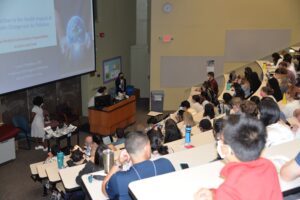New Curriculum Aims to Prepare Students for Patient Care and Residency
Albany Medical College recently renewed its curriculum to accommodate changes to the MCAT exam, USMLE exam, and changes in graduate medical education competencies and milestones.
Our new curriculum allows more time for clinical exploration and introduces meaningful clinical experiences in Years One and Two, better shaping our students’ professional identities and improving their comfort level with direct patient care.
Flexibility and Improved Experience
Changes to student clerkships and a reduction in the number of fourth year required courses provides students more flexibility for residency interviews and electives.
Revisions to the Learning to Teach: Teaching to Learn course content and scheduling improves the transition to residency.

Curriculum Plan
Our curriculum is designed keeping in mind that students have already received sound preliminary training in chemistry, physics, and biology. This serves as the foundation for building the knowledge and technical skills of a competent physician. The four-year curriculum integrates basic science and clinical medicine to accomplish this.
There are three phases in our curriculum:
- Foundations of Medical Science – a focused, shortened (18-month) phase involving integrated medical science rather than traditional discipline-specific courses combined with early, meaningful clinical care experiences
- Patient Care – full complement of required clerkships allows students to meet defined competency goals and objectives. The clinical core offers sufficient flexibility to allow students to meet competencies within a clinical setting that is most relevant to career goals.
- Advanced Patient Care - Active, guided learning rather than shadowing characterizes student involvement in required clinical clerkships. Students have time for career exploration and scholarly pursuits prior to residency application.
Our curriculum reflects the implicit social responsibility medical schools must create a future health workforce which can improve both health status and health equity in the communities they serve. At its essence, the goal of medical education is the transformation from student to healer. We expect our medical students will:
- Have expert knowledge and skills
- Be caring, compassionate, understanding team players
- Be engaged in their communities and advocate for their patients
Opportunities for dual degrees, such as MD/MPH and MD/PhD are options within the curriculum.